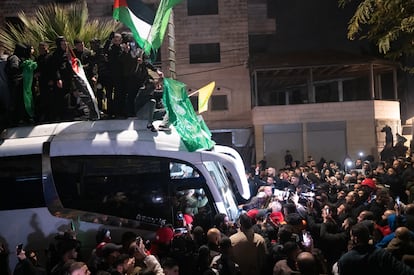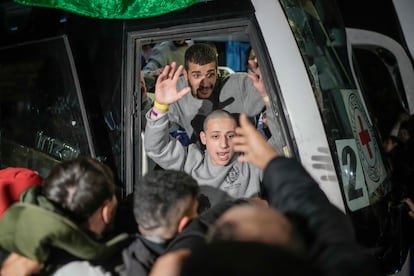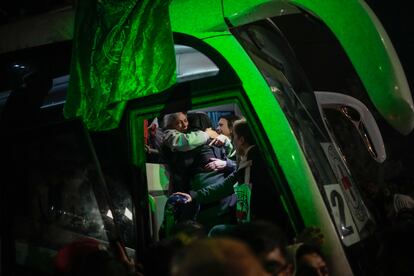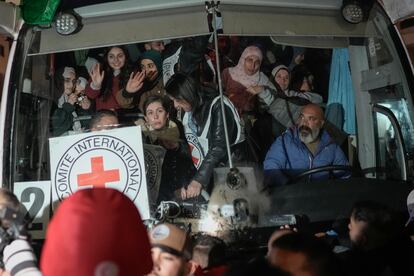West Bank celebrates release of Palestinian prisoners while praising Hamas
Two buses from the International Committee of the Red Cross transport 76 Palestinians, nearly all women, following the handover of three Israeli hostages


It is 1 a.m. and hundreds of people have been waiting for hours in the cold in the West Bank town of Beitunia. They are anticipating the release of 76 out of the 90 prisoners Israel has agreed to free after receiving three of its hostages alive from Gaza. The exchange is delayed, and Israeli troops stationed near the Ofer prison are moving closer to the roundabout. As news spreads that they are approaching, the crowd disperses in a rush, only to slowly return a short time later, like a game among teenagers.
Suddenly, everything changes. In the distance, two buses appear bearing the logo of the International Committee of the Red Cross. On board are the Palestinian prisoners — 69 of whom are women. The crowd surges forward, and the buses can barely move a few meters before coming to a standstill once again. The sky is illuminated with fireworks, while some of the prisoners raise their hands in the victory sign from inside the vehicles.
More and more young people are climbing onto the roofs of the buses, waving flags of Hamas and even the Lebanese militia Hezbollah. Today, families are celebrating the return of their loved ones, but many are also celebrating Hamas’ survival after 15 months of devastating bombings in Gaza that have finally led to this exchange. One of the chants is “The people love the Al-Qassam Brigades,” the armed wing of Hamas. Another chant praises Yahya Sinwar, the mastermind behind the October 7, 2023 attack, whose death in combat in Gaza has elevated his status among Palestinians. The dominant color on the flags is the green of Hamas.

The prisoners climb down as best they can, but they are quickly engulfed by the crowd. Balkiz Isa Dar Zurob is slow to find her father, but when she sees him, she runs to embrace him, saying, “Dad, I want to see my [six] children, I want to see my children!” “Everything will be fine now, daughter,” he replies.
Most of the prisoners just want to go home after months in Israeli prisons, which have become hell since the Hamas attack, which fueled a desire for revenge against the Palestinians — especially when far-right politician Itamar Ben Gvir held the position of head of prisons (National Security). Since then, dozens of Palestinians have died in custody. The latest, Mohamed Jaber, 22, died on Saturday, according to the Commission for Palestinian Detainees and Prisoners Affairs. He had been in administrative detention for 14 months, a controversial measure under military law through which Israel detains thousands of Palestinians without charge or a trial, often for years, and criticized by human rights organizations and U.N. agencies.
In August, the renowned Israeli human rights organization B’Tselem released a report based on 55 testimonies, concluding that since October 2023, Israel has been carrying out a “systematic, institutional policy focused on the continual abuse and torture of all Palestinian prisoners,” with both the Supreme Court and the Attorney General’s Office turning a blind eye.

Amid the chaos of celebrations and reunions, a few of the released prisoners share their experiences. One of them, Baraa Fuqaha, recounts spending six months in administrative detention, describing the prison as “a cemetery for the living.” “They were brutal with us,” she says. “We were kept in cells for 23 hours, sometimes even 24 hours in one day, with over 10 prisoners. We had no winter clothes and only one blanket. They left the windows open, and it was very cold. That was our daily life.”
Hanan Malawan, 23, has just stepped off one of the buses and is surrounded by a crowd of people taking photos with their phones. “They tried to take away our joy until the last day,” she says of the five months she spent in prison, which have now come to an end. “Yesterday [Saturday], we asked [the guards] if we were leaving or not, and they told us: ‘You’re not leaving at all.’ We believed them. They gave us breakfast and lunch, saying we weren’t going anywhere. Then, suddenly, they left me alone in a cell. I almost fainted from fear. After a while, they asked me, ‘Are you Hanan Malawan?’ I replied, ‘Yes.’ Then they took me out, and I was jumping for joy.” She has returned to her home in the Nablus area of the northern West Bank.
Almost everything happening highlights the diminished prestige of the Palestinian Authority (PA), particularly due to its security collaboration with Israel and its subdued role during the Gaza war. In fact, unlike the first prisoner exchange, it has not organized an official reception, likely to avoid further backlash during a period of significant internal disrepute.

Especially today. A day when the general sentiment is that it is the use of force — specifically the taking of hostages by Hamas — that is facilitating the return of the prisoners. Ahmad Hassad, 18, who has been part of two exchanges in this war, speaks bluntly. He was released during the previous ceasefire in November 2023 and re-arrested the following year. Now, he is free again. “Thanks to the Al-Qassam Brigades and the fighters in Gaza, who humiliated and painfully beat Israel,” he declares. He then gestures disdainfully toward the few members of the PA security forces present: “There were clashes in Ofer [between young Palestinians and Israeli soldiers], and none of them came to protect us.” “What the resistance has done for us has not been done by anyone else,” he adds.
The demonstrators waved flags of Hamas, the Democratic Front for the Liberation of Palestine, and even Hezbollah, a Lebanese militia-party, as well as flags from Yemen, where the Houthi militia had been launching missiles and drones against Israel until Saturday. Very few flags from Fatah, the party of PA President Mahmoud Abbas, were seen. Fatah spokesman Abdel Fattah Dawla, who was at the scene, downplayed the significance of the flags: “At the meeting of the Palestinian National and Islamic Forces committee, we agreed to only wave the Palestinian flag. Then there are other people who are free to wave whatever they want. It means nothing.”
There are quite a few people, but not everyone has dared to come. Several factors have affected turnout. Ultra-nationalist Jewish settlers opposed to the ceasefire in Gaza are stoning cars as they pass through the area, and have burned Palestinian homes and vehicles in collective retaliation. Some families of prisoners are afraid and prefer to wait for their loved ones at home. The memory of the first hostage-for-prisoner exchange in November 2023 also lingers, when Israeli soldiers fired tear gas at the same roundabout to stop the celebrations.
They are not allowed to celebrate now either. Mohamed Amer (whose daughter Jenin was released in the exchange) was reminded of this by telephone this afternoon by an officer from the Shin Bet, Israel’s intelligence service. “He told me, ‘I don’t want to see a Hamas flag or a celebration. If they raise a single flag, we’ll go into the house,’” says Amer, as he stands near a bonfire a group of young people had lit to stay warm.
Sign up for our weekly newsletter to get more English-language news coverage from EL PAÍS USA Edition
Tu suscripción se está usando en otro dispositivo
¿Quieres añadir otro usuario a tu suscripción?
Si continúas leyendo en este dispositivo, no se podrá leer en el otro.
FlechaTu suscripción se está usando en otro dispositivo y solo puedes acceder a EL PAÍS desde un dispositivo a la vez.
Si quieres compartir tu cuenta, cambia tu suscripción a la modalidad Premium, así podrás añadir otro usuario. Cada uno accederá con su propia cuenta de email, lo que os permitirá personalizar vuestra experiencia en EL PAÍS.
¿Tienes una suscripción de empresa? Accede aquí para contratar más cuentas.
En el caso de no saber quién está usando tu cuenta, te recomendamos cambiar tu contraseña aquí.
Si decides continuar compartiendo tu cuenta, este mensaje se mostrará en tu dispositivo y en el de la otra persona que está usando tu cuenta de forma indefinida, afectando a tu experiencia de lectura. Puedes consultar aquí los términos y condiciones de la suscripción digital.








































